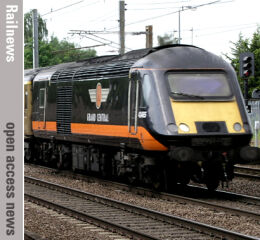Posted 22nd May 2024 | 3 Comments
Open access enthusiasm grows, as Arriva joins in

Another operator is bidding to expand the range of open access services.
Arriva, which owns Grand Central, says an application has been submitted to the Office of Rail and Road to run two additional daily return services between Bradford and London, with up to eight intermediate station calls. This would bring the daily total of trains on the route to six.
It is also proposing to run a new early morning York-London journey, with a return working in the late evening, as well as providing four new daily calls on its Sunderland route at Seaham in County Durham, which would give the town direct London trains for the first time.
Arriva UK managing director David Brown said: ‘These proposals would bring more services and choice to passengers, building on the success of Grand Central’s open access operations, which connect a number of under-served communities in both the North East and West Yorkshire to London. This is a growth opportunity for the railway and a positive development for passengers and for our colleagues at Grand Central. By delivering additional services through open access, we can encourage more train travel, which is good for the environment and for communities, helping to ensure Britain’s rail system can thrive long into the future.’
The move by Arriva to expand Grand Central follows several other open access developments in recent months.
Grand Union has already gained a licence to run between London and Carmarthen, but on 7 March the ORR approved another application from GU, this time between London Euston and Stirling via Larbert, Greenfaulds and Whifflet.
A week later, Alstom and SLC Rail submitted an open access proposal to the ORR for services between London, Shropshire and Wrexham, recalling the former Wrexham and Shropshire operation but using London Euston rather than Marylebone, approaching London on the West Coast Main Line from Nuneaton and Milton Keynes.
On 17 May FirstGroup unveiled plans for more open access services on the West Coast Main Line between Rochdale and London Euston, which would also be branded Lumo. There would be six daily return journeys.
The latest development until Arriva’s proposals had been an application from Virgin for new services from London Euston to Birmingham, Manchester, Liverpool and Glasgow.
The Conservatives are in favour of private sector rail operators in general, while Labour has said that if it is elected open access services would continue, but potentially under new guidance to the ORR from the transport secretary.
Reader Comments:
Views expressed in submitted comments are that of the author, and not necessarily shared by Railnews.

david C smith, Bletchley
Some years ago, my wife and I were holidaying in York. and decided to make a "side trip"to Newcastle for one day. Three train operators ( East Coast Mainline, Transpennine and Cross Country ) catered for this .
We could make a choice between an all - operators fare, or a cheaper one restricted to Cross Country. We decided to "shell out" on the all - operators tickets, but this was at least a choice we could exercise.
Chris Jones-Bridger, Buckley Flintshire
Given that this article was published before the General Election date was announced it will be interesting how these open access announcements play out when the result is known. It would be easy to categorise several of the bids as kite flying exercises however Arriva's proposal is to build on an already existing operation. One of the challenges will be convincing ORR that the proposals genuinely increase rail's market share or seriously abstract business from the contracted operators. This I believe remains a serious flaw in the open access model in that rather than having clearly defined revenue pots the open access operators are able to claim a share in the revenue of non operator specific tickets on shared flows.
John Porter , Leeds
I hope any advice to ORR insists on operators accepting their competitors tickets, subject to an on train supplement where there is a price difference, or credit card discount - to compensate for the fare extraction from the established operator.